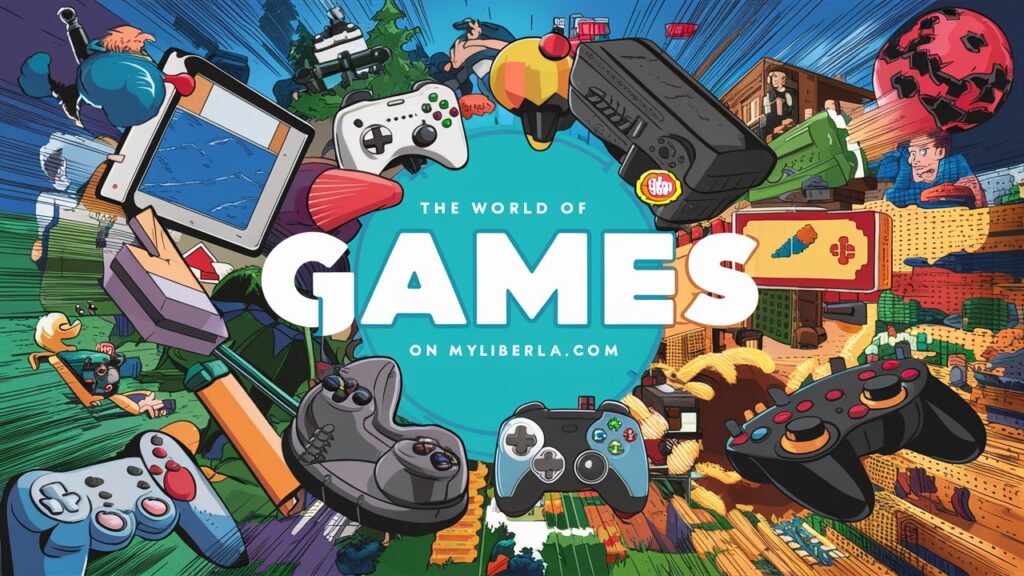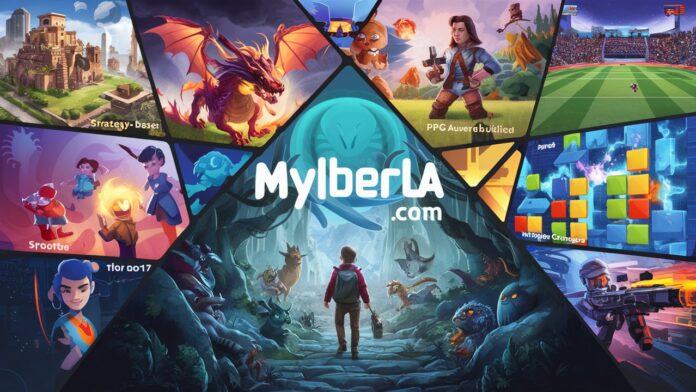Introduction
The gaming universe is vast, diverse, and constantly evolving, offering something for everyone—whether you’re a casual player, a competitive enthusiast, or a storytelling aficionado. At MyLiberla.com, we believe understanding the types of games available is key to discovering your next favorite adventure. This guide dives deep into popular game categories, their mechanics, and what makes each unique. From adrenaline-pumping action titles to mind-bending puzzles and immersive role-playing epics, we’ll explore how these genres captivate players worldwide. Let’s embark on this journey to uncover the rich tapestry of gaming experiences waiting for you.
1. Action and Adventure Games: Thrills, Challenges, and Exploration
Keywords: Action games, Adventure games, Platformers, Open-world games, Stealth games
Action and adventure games dominate the gaming landscape with their fast-paced gameplay and narrative-driven experiences. Action games prioritize reflexes and combat, such as God of War or Call of Duty, where players engage in battles, shootouts, or martial arts. Subgenres like platformers (e.g., Super Mario Bros.) focus on jumping and precision, while stealth games (e.g., Metal Gear Solid) reward patience and strategy.
Adventure games, on the other hand, emphasize storytelling and exploration. Titles like The Legend of Zelda or Uncharted blend puzzle-solving, character development, and sprawling worlds. Open-world games like Assassin’s Creed Valhalla take this further, offering vast landscapes to explore at your own pace. These genres appeal to players seeking excitement, discovery, and cinematic storytelling.
2. Role-Playing Games (RPGs): Crafting Your Own Legacy
Keywords: RPGs, JRPGs, Western RPGs, Action RPGs, Character customization
Role-playing games (RPGs) immerse players in richly detailed worlds where choices shape the narrative. JRPGs (Japanese RPGs) like Final Fantasy or Persona 5 feature turn-based combat and linear stories, while Western RPGs like The Witcher 3 or Skyrim prioritize player agency and open-ended quests.
A key feature of RPGs is character customization, allowing players to build unique avatars with distinct skills, appearances, and moral alignments. Action RPGs such as Dark Souls or Diablo merge real-time combat with progression systems, offering both challenge and depth. Whether you’re saving kingdoms or navigating moral dilemmas, RPGs provide endless opportunities for personal storytelling.
3. Strategy Games: Mastering Tactics and Resource Management
Keywords: Strategy games, Real-time strategy (RTS), Turn-based strategy, 4X games, City-building
Strategy games test your intellect and foresight, requiring careful planning to outwit opponents. Real-time strategy (RTS) games like StarCraft II demand quick decision-making as you manage armies and resources in fast-paced battles. Conversely, turn-based strategy titles like Civilization VI let you deliberate over empire-building, diplomacy, and warfare.
Subgenres like 4X games (e.g., Sid Meier’s Civilization) focus on “explore, expand, exploit, exterminate,” while city-building games like Cities: Skylines challenge players to design and sustain thriving metropolises. These games cater to analytical minds who enjoy long-term planning and tactical mastery.

4. Simulation Games: Living Alternate Realities
Keywords: Simulation games, Life simulators, Vehicle simulators, Farming simulators
Simulation games replicate real-world activities, offering players a chance to experience everything from piloting planes to managing virtual families. Life simulators like The Sims 4 let you create characters, build homes, and navigate relationships. Vehicle simulators such as Microsoft Flight Simulator emphasize realism, providing authentic controls and physics.
Meanwhile, farming simulators like Stardew Valley blend relaxation with resource management, tasking players with cultivating land and fostering community. These games are ideal for those seeking escapism, creativity, or a low-stress gaming experience.
5. Sports and Racing Games: Competing for Glory
Keywords: Sports games, Racing games, Sports simulators, Arcade racing
Sports and racing games bring the excitement of physical competition to your screen. Sports simulators like FIFA or NBA 2K replicate real-world leagues with realistic mechanics and licensed teams, while arcade-style sports games (e.g., Rocket League) prioritize fun over realism.
Racing games also split into subgenres: simulation racers like Forza Motorsport focus on authentic driving physics, whereas arcade racers like Mario Kart deliver chaotic, power-up-fueled fun. Whether you’re scoring goals or drifting around corners, these genres cater to competitive spirits.
6. Puzzle Games: Exercising Your Brain
Keywords: Puzzle games, Logic puzzles, Physics puzzles, Escape room games
Puzzle games challenge players to solve problems using logic, pattern recognition, or creativity. Classics like Tetris and Candy Crush test spatial awareness and quick thinking, while narrative-driven titles like Portal 2 incorporate physics-based puzzles into their storytelling.
Escape room games such as The Room series offer immersive, tactile challenges, requiring players to manipulate objects and uncover secrets. These games are perfect for mental stimulation or a relaxing solo session.
7. Massively Multiplayer Online Games (MMOs): Connecting in Virtual Worlds
Keywords: MMOs, MMORPGs, Online multiplayer, Guilds, PvP/PvE
MMOs create persistent online worlds where thousands of players interact simultaneously. MMORPGs (Massively Multiplayer Online RPGs) like World of Warcraft or Final Fantasy XIV combine RPG elements with cooperative quests, player-vs-environment (PvE) raids, and player-vs-player (PvP) battles.
These games thrive on social interaction, with players joining guilds to tackle challenges together. MMOs often feature evolving storylines and regular updates, ensuring endless content for dedicated fans.
8. Casual Games: Quick Fun for Everyone
Keywords: Casual games, Mobile games, Hyper-casual games, Match-3 games
Casual games are designed for short, accessible play sessions. Mobile games like Candy Crush Saga or Among Us dominate this category, offering simple mechanics and intuitive controls. *Match-3 games* (e.g., Bejeweled) and hyper-casual titles (e.g., Flappy Bird) appeal to broad audiences with their pick-up-and-play design.
These games are perfect for filling spare moments or introducing non-gamers to the hobby.
9. Horror and Survival Games: Fear and Adrenaline
Keywords: Horror games, Survival horror, Psychological horror, Survival crafting
Horror and survival games immerse players in terrifying scenarios where tension and resource scarcity heighten the experience. Survival horror classics like Resident Evil combine combat with limited supplies, while psychological horror titles like Silent Hill focus on atmosphere and existential dread.
Survival crafting games such as The Forest or Subnautica task players with gathering resources while evolving threats. These genres are ideal for thrill-seekers who enjoy heart-pounding challenges.
10. Educational and Serious Games: Learning Through Play
Keywords: Educational games, Serious games, Edutainment, Historical games
Educational games blend entertainment with learning, making them popular in classrooms and homes. Titles like Math Blaster teach core subjects through gameplay, while historical games like Assassin’s Creed Discovery Tour offer interactive lessons on ancient civilizations.
Serious games address real-world issues, such as Papers, Please, which explores immigration policies. These games prove that play can be both fun and enlightening.
Conclusion
From the strategic depths of Civilization VI to the whimsical charm of Animal Crossing, games offer endless ways to escape, compete, and learn. At MyLiberla.com, our goal is to help you navigate this diverse universe and find experiences that resonate with your interests. Whether you’re a seasoned gamer or a curious newcomer, there’s a genre—and a community—waiting for you. Dive in, experiment, and let the games begin!
Frequently Asked Questions (FAQs)
Q1: What’s the difference between RPGs and action-adventure games?
A: RPGs focus on character progression and player-driven stories, while action-adventure games emphasize linear narratives and real-time combat.
Q2: Are simulation games only for hardcore gamers?
A: Not at all! Games like Stardew Valley or The Sims are beginner-friendly and designed for relaxation.
Q3: Can educational games really help with learning?
A: Yes! Studies show that interactive gameplay improves retention and engagement in subjects like math, history, and science.
Q4: What defines a “casual” game?
A: Casual games prioritize simplicity and short play sessions, often with intuitive mechanics (e.g., Candy Crush).
Q5: Which MMO is best for beginners?
A: Final Fantasy XIV offers a welcoming community and a free trial, making it ideal for newcomers.
Explore more gaming guides and recommendations at MyLiberla.com—your ultimate hub for all things gaming! 🎮


